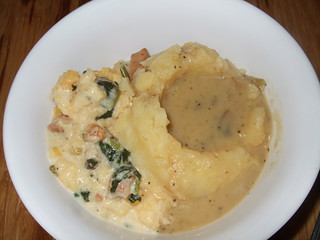African Irish Irio Colcannon: Honoring a Shared Heritage This St. Patrick’s Day
African–Irish Irio Colcannon — A Dish That Honors a Shared Journey

St. Patrick’s Day often celebrates Irish heritage with green beer and parades, but it’s also a day for anyone with African and Irish roots to reflect on a fascinating, often overlooked shared history — and what better way than through food. Our dish today, Irio Colcannon, fuses a beloved Kenyan comfort food with the Irish classic colcannon, turning a holiday table staple into a story of connection.
The Food Story — From Nairobi to Dublin
In Kenya, Irio is mashed potatoes enriched with peas, corn, and leafy greens such as pumpkin leaves. In Ireland, colcannon is buttery mashed potatoes blended with cabbage or kale. When Irish migrants and African communities encountered one another, potatoes were a universal language — a crop both peoples relied on for survival during famine, colonial disruption, and migration. Blending these two dishes is more than culinary creativity; it’s a nod to shared endurance and adaptation.
For African–Irish families today, serving Irio Colcannon on St. Patrick’s Day is a way to honor ancestors who navigated ocean crossings, colonial hardships, and cultural blending — yet kept their food memories alive.
Ingredients (Serves 4–6)
- 3 large high-starch potatoes (Russets or Yukon Golds)
- 2 cups chopped pumpkin leaves (or kale/spinach if unavailable)
- ½ cup frozen green peas
- ½ cup frozen sweet corn
- ½ cup vegetable or chicken broth
- 4 tablespoons Irish butter (plus extra for serving)
- ½ cup whole milk or cream
- Salt and freshly ground black pepper to taste
- Optional: fresh parsley or chives for garnish
Directions
- Peel and chop potatoes; boil in salted water until tender, about 15–20 minutes. Drain well.
- In a separate pot, simmer pumpkin leaves (or kale/spinach) in broth until soft, about 5 minutes. Add peas and corn for the last 2 minutes. Drain if needed.
- Mash potatoes with butter and warm milk until smooth and creamy.
- Fold in greens, peas, and corn. Season with salt and pepper to taste.
- Serve warm with an extra pat of butter and fresh herbs for a festive finish.
African Irish Heritage Food
Food isn’t just sustenance — it’s memory. For people with African and Irish ancestry, recipes like this help reclaim a story that isn’t often told: how two resilient cultures found common ground in the face of hardship. By making Irio Colcannon, you’re cooking history — a dish that says, “We are here, we remember, and we celebrate all of who we are.”


